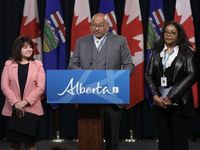Alberta is facing a serious health crisis as the number of confirmed measles cases has surged to 313, marking the highest count since the 1980s. As of May 8, 2025, the outbreak has prompted health officials and doctors to sound the alarm, urging the public to get vaccinated against this vaccine-preventable disease.
The resurgence of measles in Alberta began approximately two months ago, and the situation has escalated rapidly. Dr. James Talbot, a former Chief Medical Officer of Health in Alberta, warned, "Once you get to 1,000 cases, you can expect between one and three deaths. Measles could also lead to serious complications like deafness, seizures, or problems with mental development." With 19 individuals already hospitalized, the urgency of the situation is clear.
The response from the Alberta government has been criticized for being slow. Sarah Hoffman, the Alberta NDP Health Critic, stated, "The government waited until we went from a few dozen cases to 200 cases before they started raising alarms. Now we’re over 300 cases, and more people are requiring hospitalization." In contrast, Health Minister Adriana LaGrange acknowledged the need for action, stating, "We are now at a 68% increase in immunization compared to last year, so we are getting that information out. Of course, we want people who are unimmunized or underimmunized to get out and get those immunizations. So, we’re going to continue to do that work. It’s having results."
In response to the outbreak, the province is launching an advertising campaign aimed at increasing vaccination rates, which is set to begin on May 12, 2025. Dr. Shelley Duggan, President of the Alberta Medical Association, expressed her support for this initiative, stating that it is crucial to increase access to vaccination clinics.
As health officials work to combat the outbreak, they face the challenge of misinformation surrounding vaccines. Dr. Lynora Saxinger, an infectious disease specialist, highlighted the dangers of disinformation campaigns that profit from spreading falsehoods about vaccine safety. "Disinformation is misinformation put there for a reason, and this is actually a big business. People profit from disinformation campaigns, and they are increasingly prevalent on social media. And it is getting worse," she stated.
Measles symptoms include fever, coughing, a runny nose, red eyes, and a blotchy, red rash that appears three to seven days after the fever starts. To assist the public, Alberta has set up a new measles hotline at 1-844-944-3434, where individuals can check their immunization records or book appointments.
Meanwhile, neighboring Manitoba is also experiencing a rise in measles cases, with 20 confirmed and four probable cases reported as of May 7, 2025. Health officials attribute the increase to low immunization rates in the Southern Health-Santé Sud health region, particularly around Winkler. Dr. Davinder Singh, co-lead of Manitoba's immunization program, emphasized the importance of vaccination, stating, "It's within people's control to do something about this, and the most effective thing by far to get immunized. So if, for whatever reason, you didn't get immunized up to now, now is the perfect time to get your first immunization."
In Manitoba, children aged 12 months and older are eligible for two doses of the MMR (measles, mumps, rubella) vaccine. For children between six and 12 months, one dose can be administered if they have travel plans to a measles-endemic country. Public health officials are currently evaluating the possibility of allowing children under one year old to receive their first dose.
Dr. Peter Hotez, a pediatrician and virologist, warned that measles is one of the most contagious viruses known and that outbreaks are more likely when immunization rates drop below 90%. Earlier this year, two unvaccinated children died in Texas after contracting measles, underscoring the seriousness of the disease.
Dr. Ruth Grimes, a pediatrician at the University of Manitoba, remarked on the increased inquiries from parents regarding vaccinations. She recounted a case from a few years ago where a child who contracted measles later developed pneumonia. "Happily, that child did have a positive outcome. The difficulty is that you cannot predict who is going to have a good outcome and who isn't," Grimes said. She further stressed the importance of keeping immunizations up to date to prevent severe complications and deaths from measles.
As both Alberta and Manitoba grapple with rising measles cases, the need for public awareness and vaccination is more critical than ever. The Alberta government has announced expanded access to immunization clinics, with walk-in availability and extended hours in central and southern zones. A provincewide awareness campaign will also roll out soon, featuring messages in over 14 languages.
In Alberta, Dr. Sunil Sookram, the interim Chief Medical Officer of Health, stated, "We are facing our highest number of measles cases in decades. Up until now, we thought the disease had been eradicated, but things have changed." He noted that the decrease in vaccine coverage is due to safety concerns, cultural beliefs, or misinformation.
Dr. Ifeoma Achebe, Medical Officer of Health for the AHS central zone, emphasized that achieving herd immunity requires 95% of the population to be vaccinated. Currently, 90% of the population in the central zone is immunized, while the figure is only about 72% in the south zone. This discrepancy is contributing to the ongoing outbreak.
As the situation develops, both provinces are urging residents to review their immunization records and take action to protect themselves and their communities. The message is clear: vaccination is vital in preventing the spread of measles and safeguarding public health.




